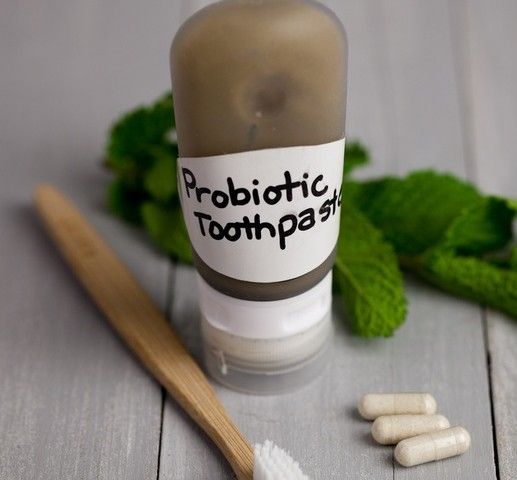Creating your own probiotic toothpaste at home is a great way to maintain oral health using natural and beneficial ingredients. This homemade probiotic toothpaste combines the cleaning power of coconut oil and bentonite clay with the health benefits of probiotics and prebiotics. While it might not look as polished as commercial toothpaste, it offers excellent benefits for your mouth. Here’s how you can make and use it.
Homemade Probiotic Toothpaste
A blend of coconut oil, bentonite clay powder, probiotics, and prebiotics forms the foundation of this homemade probiotic toothpaste recipe. Bentonite clay powder, which appears off-white or pale gray in the jar, turns a more intense brownish-gray when mixed with coconut oil. This color change is normal. Although your probiotic toothpaste might not win any beauty contests, your mouth will love it! Be sure to stir until completely blended. The mixture will be a bit runny at first, but it will set up as it cools. Making smaller batches more frequently ensures freshness.Scoop the completed paste into a small glass jar with a lid. Using a jar is preferable to a tube because coconut oil liquefies at 76°F, making the paste soft or even runny at warm room temperatures and very firm at cool room temperatures (even low 60s), which makes it hard to squeeze out of a tube. Store the jar at room temperature.

Tips:
- Adding more clay helps keep your paste firmer in warm weather; adding less clay makes it less firm, which makes dispensing it easier in the winter if your house is cool.
- Probiotics are living beneficial bacteria; for this recipe, pick one that can be stored at room temperature.
- Prebiotics are natural fiber compounds that boost the activity of probiotic bacteria.
- Bentonite clay tastes mild and clay-like. Adding xylitol makes the paste sweeter, which kids may find more acceptable.
- Pleasantly-flavored essential oils help make the paste more palatable and leave a nice aftertaste.
How to Use Your Homemade Probiotic Toothpaste
Using a small spoon or knife, scoop about a ½ teaspoon of probiotic toothpaste onto your brush (pressing your brush into the paste works too, but make sure each person in the family has their own jar if you do this). Brush your teeth and all other surfaces in your mouth thoroughly. The paste will liquefy almost immediately when put into your mouth, so there is no need to add water. When you are done brushing, swish the liquid around, forcing it through the gaps between your teeth. This helps to get the probiotics into all the nooks and crannies your brush can’t reach. Then spit out the remainder and rinse with water.
Ingredients
- 2 tablespoons coconut oil
- 1–2 tablespoons bentonite clay
- 1 capsule of organic probiotics
- 1 capsule of FOS (fructooligosaccharides) or other inulin-type prebiotic
- Up to 1/2 tablespoon xylitol powder (optional)
- Up to 10 drops of peppermint essential oil or other essential oil
- Small jar
Directions
- Liquefy Coconut Oil: Place the coconut oil container in a bowl of hot water to liquefy some of it (depending on your room temperature, this may take up to 15 minutes).
- Measure Ingredients: Measure all ingredients into a small bowl.
- Open Capsules: Open the probiotic and prebiotic capsules by grabbing the ends with the tips of your fingers while holding them over the bowl and gently pulling and twisting. Once open, dump the powder into the bowl.
- Mix: Stir until completely blended. The mixture will be a bit runny, but it will set up as it cools.
- Store: Scoop the paste into a small glass jar with a lid. Store at room temperature.
By making your own probiotic toothpaste, you ensure that you’re using natural, beneficial ingredients that support your oral health. Enjoy the benefits of a cleaner, healthier mouth with this easy-to-make homemade toothpaste!
Benefits of Homemade Probiotic Toothpaste
1. Improves Oral Health
Probiotics help to balance the bacteria in your mouth, promoting a healthier oral environment. By introducing beneficial bacteria, this toothpaste helps reduce harmful bacteria that cause bad breath, gum disease, and tooth decay.
2. Natural and Chemical-Free
Unlike many commercial toothpastes that contain harsh chemicals and artificial ingredients, homemade probiotic toothpaste is made with natural components that are gentle on your teeth and gums.
3. Promotes Stronger Teeth and Gums
Bentonite clay is rich in minerals that help to strengthen teeth and gums. It also acts as a mild abrasive to clean teeth without damaging enamel.
4. Reduces Inflammation and Infection
Coconut oil has natural antimicrobial properties that help to kill harmful bacteria in the mouth. It can reduce inflammation and prevent infections, contributing to overall oral health.
5. Customizable for Your Needs
You can customize the recipe to suit your preferences, adjusting the sweetness, flavor, and texture. This makes it easier to create a toothpaste that your entire family will enjoy using.
6. Cost-Effective
Making your own toothpaste at home can be more cost-effective than buying commercial brands. You can make smaller batches to ensure freshness, and the ingredients are often less expensive when bought in bulk.